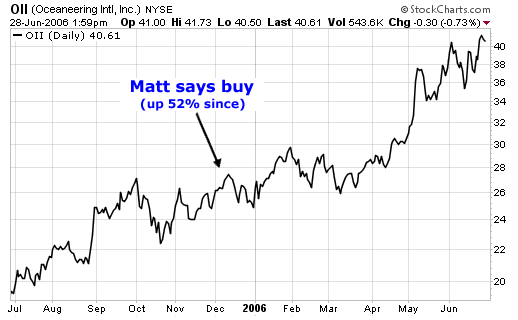| Home | About Us | Resources | Archive | Free Reports | Market Window |
Kenya Needs More SweatshopsBy
Thursday, June 29, 2006
June Arunga wishes Kenya had more sweatshops. June is a native of Kenya. She makes documentaries for the BBC on African poverty. She says Kenyans would volunteer to work for free in sweatshops just to have access to clean running water. Access to fresh running water remains a mirage for Kenya's poor. I read yesterday that, “at any given moment, about half of the world's poor are suffering from waterborne diseases, of which over 6,000 – mainly children – die each day by consuming unsafe drinking water.” And they say the problems are getting worse. I don't want to appear callous... but as you'll come to see in much of the work we do, the best investment opportunities are always found in a crisis. The 1986 farm crisis I wrote about on Tuesday was a perfect example. Crop prices doubled as soon as all the farmers filed for bankruptcy. Right now, except for a few oddball contrarians like me, interest in water investment is low. Why would you invest in water? Most Americans have unlimited access to clean water. In this case, the crisis is the fact that no one’s noticed how important water is. People waste it. No one invests in its future. The best time to buy is when you don't want to. This is the point. I want to buy things when no one else is interested and I can get in for pennies. Water is the perfect investment opportunity. It's valuable, yet you can still get in cheap, before the crowd. Check out this news from Bloomberg I found this morning: “From hedge fund manager Boone Pickens to buyout specialist Guy Hands, the world's biggest investors are choosing water as the commodity that may appreciate the most in the next several decades.” Pickens, the Dallas hedge fund manager and oil billionaire, spent more than $50 million for water rights around his 24,000- acre ranch in North Texas. He says he has enough water to serve 20 percent of the Dallas-Fort Worth area. So far, Pickens, 78, has failed to convince any Texas cities to buy his water, and he needs a commitment before he can build a $2 billion pipeline system.” The thing about water is it's not an easy commodity to invest in. Pickens went for the pure play. He bought the commodity itself. I asked legendary investor Jim Rogers about this strategy a few weeks ago in London. He said it’s a bad idea to buy the water outright, because when the crisis hits and everyone’s dying of malaria, you’ll be labeled as an evil speculator and the government will steal your water rights. Instead, invent a way to transport it or purify it, and they’ll make you a saint. You’ll make a fortune as well. So far, Jim hasn’t found any water stocks he likes, though they do exist. All the biggest stocks are water utilities. They supply water and sewage treatment services to large cities around the world. The Bloomberg article I quoted from above mentions most of the major market-listed players. Veolia Environment (VE) and Suez (SZE) are the world’s biggest water utilities. The Powershares Water Resources ETF (PHO), is the best way for investors to own a basket of water stocks. It’s up around 10% this year. American States Water (AWR) provides water and electricity to California. It’s the largest holding. The thing is, water utilities aren’t going to solve the world’s water crisis. I’m more interested in innovative companies like the Vestergaard Frandsen Group from Switzerland. They’ve patented an invention that purifies water as you suck it through a straw, so you can drink fresh water from dirty rivers and ponds. It costs less than two dollars and they say it could be one of the greatest lifesaving inventions of all time. Unfortunately, Vestergaard is a private company. Until I find the perfect stock, agriculture is my favorite water play. According to Bloomberg, “To produce one ton of meat takes 7 tons of corn. To produce 7 tons of corn takes 7,000 gallons of water.” If water costs go up, you can be sure corn and beef prices will rise too. That’s why I own both. Tom Market NotesWAR, WEATHER AND WEASELS WITH POWER
Yesterday, we asked for your thoughts on the future of crude oil… Up or Down? Our favorite reply came by way of Texas… from Kerry L. His take on what drives oil shows how blasted hard it is to answer our question: “World demand is for the refined products, so the only thing that will greatly affect the price at this point is disruption of the supply output due to war, weather, or weasels in positions of power (OPEC, etc.).” The DailyWealth take? Even if oil declines by $20 a barrel… a handful oil companies will still make tons of money. And there’s nobody better at finding these companies than Matt Badiali, editor of the S&A Oil Report. Matt told DW readers to buy oil service firm Oceaneering International (OII) back in December. As our chart shows, he’s been right in a big way.
-Brian Hunt
|
Recent Articles
|


